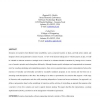Free Online Productivity Tools
i2Speak
i2Symbol
i2OCR
iTex2Img
iWeb2Print
iWeb2Shot
i2Type
iPdf2Split
iPdf2Merge
i2Bopomofo
i2Arabic
i2Style
i2Image
i2PDF
iLatex2Rtf
Sci2ools
103
click to vote
ACMSE
2000
ACM
2000
ACM
Hyperscenarios: a framework for active narrative
Scenarios are narratives that illustrate future possibilities, such as proposed systems or plans, and help policy makers and designers choose among alternative courses of action. In view of the decision-making uses to which scenarios are put, it would be valuable to elaborate scenarios at multiple levels of detail or to substitute detailed eventualities by starting from a common core of narrative episodes and refining them differently. Although domain-specific techniques and computational environments exist for encoding simulating and manipulating scenarios, there exist no general-purpose scenario representations between the extremes of formality and informality provided by executable simulation programs at one extreme and free-form text or streaming media descriptions at the other. The challenge is to define a representation for scenarios that supports a wide range of discussion and comprehension activities while remaining independent of content and access mechanisms. Our approach is...
ACMSE 2000 | General-purpose Scenario Representations | Manipulating Scenarios | Scenarios | Theoretical Computer Science |
Related Content
| Added | 01 Aug 2010 |
| Updated | 01 Aug 2010 |
| Type | Conference |
| Year | 2000 |
| Where | ACMSE |
| Authors | Reginald L. Hobbs, Colin Potts |
Comments (0)

